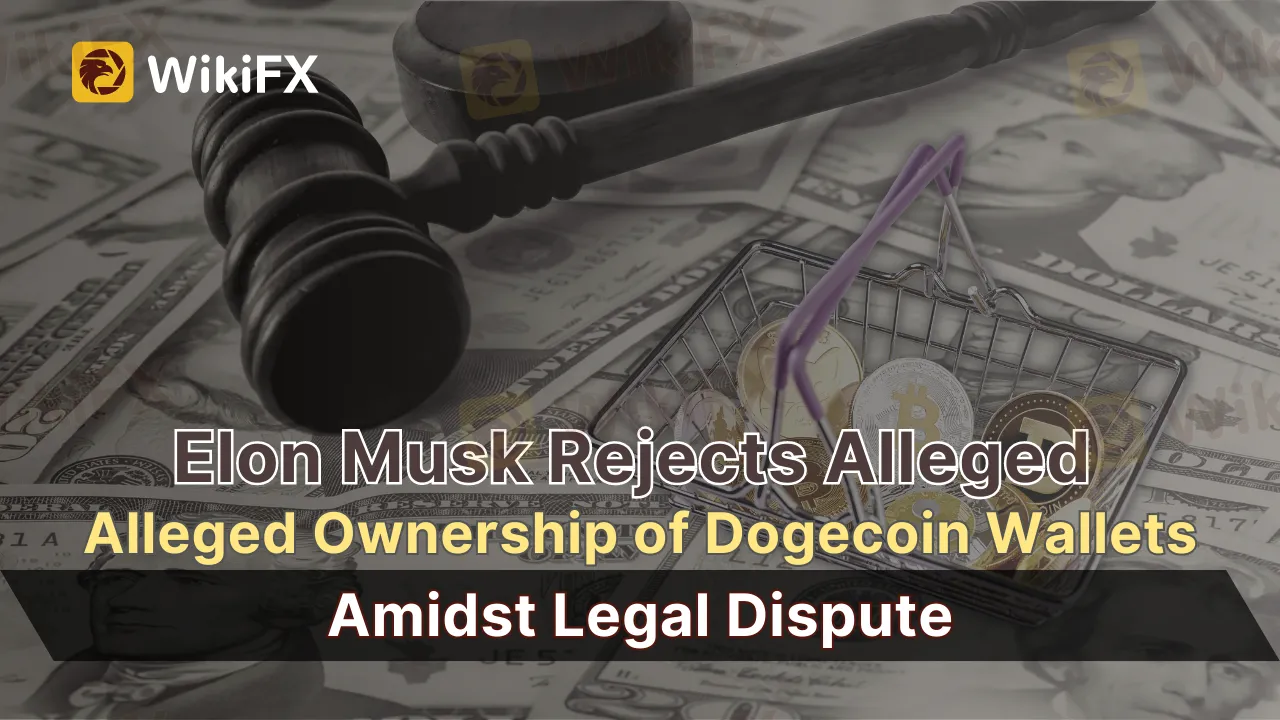简体中文
繁體中文
English
Pусский
日本語
ภาษาไทย
Tiếng Việt
Bahasa Indonesia
Español
हिन्दी
Filippiiniläinen
Français
Deutsch
Português
Türkçe
한국어
العربية
Elon Musk Rejects Alleged Ownership of Dogecoin Wallets Amidst Legal Dispute
Abstract:Elon Musk refutes insider trading claims linked to Dogecoin in a lawsuit. This article delves into the allegations, Musk's response, and the potential impact on cryptocurrencies.

In the midst of a class action lawsuit, Tesla's Chief Executive Officer, Elon Musk, repudiates claims accusing him of holding Dogecoin wallets linked to insider trading activities. The lawsuit implicates Musk in a supposed plot to prop up the meme-based digital currency, Dogecoin. Judicial documentation asserts that two wallets purportedly tied to Musk traded 1.4 billion Dogecoins — an equivalent of over $124 million — within a span of forty-eight hours in April.
Musk's legal representative, Alex Shapiro, has outrightly rejected these allegations, citing a lack of substantive proof and dismissing them as unfounded. These claims have been revised and amplified by a consortium of Dogecoin investors, asserting that Musk leveraged his vast Twitter audience for market manipulation purposes.
Elon Musk, called the “Dogefather” and “CEO of Dogecoin,” has publicly shown his support for the meme-themed cryptocurrency several times, regularly tweeting about it. Dogecoin, which began as a joke in 2013, has grown in popularity and market capitalization to become the ninth biggest digital currency, with an estimated value of $8.7 billion at the time of writing.
The legal action being pursued against Musk alludes to alleged strategic tactics employed to artificially inflate the digital coin's market value. The complainants underscore Musk's commanding presence on social media and his cameo on NBC's Saturday Night Live as evidence of his perceived manipulation. The court will ultimately be tasked with discerning whether Musk's association with Dogecoin transcends mere provocative commentary on Twitter.
A well-known aficionado of cryptocurrencies, Musk has consistently demonstrated his penchant for Dogecoin, often employing his tweets to create waves in the cryptocurrency market. This social media influence has significantly impacted Dogecoin's price fluctuations, often sending its value on an upward trajectory following his tweets. Musk's “Dogefather” nickname is a testament to his sway over the Dogecoin community.

However, this affection for Dogecoin and the consequential market movements have led to Musk facing accusations of orchestrating market manipulation. The lawsuit suggests that Musk intentionally stirred the digital currency's price for personal gains, with the sales from the alleged wallets pointing to his complicity in insider trading.
These allegations are notably serious, given the potential ramifications of market manipulation and insider trading. They not only jeopardize the integrity of financial markets, but they also erode investor trust, especially in the cryptocurrency realm, which is still mostly unregulated and hence open to such unscrupulous activities.
Musk's legal team, on the other hand, has rejected the complaint as groundless, claiming a lack of solid proof tying Musk to the Dogecoin wallets in the issue. They maintain that the charges are purely hypothetical and not based on facts.
Musk's association with Dogecoin has sparked significant controversy and investigation. While some perceive him as a champion of the “people's currency,” others are skeptical of his conduct, which has resulted in the present legal action.
In a digital era where influence can be wielded through tweets, the lawsuit against Musk shines a spotlight on the potentially hazardous interplay between social media and financial markets. It raises essential questions about accountability, influence, and the boundaries of legal and ethical behavior in these rapidly converging spaces.
The case's outcome will significantly impact the cryptocurrency world, potentially setting a precedent for future scenarios involving influential figures and market manipulation accusations. As the legal proceedings unfold, the court must assess whether Musk's frequent tweets and public persona equate to market manipulation, or if they are merely expressions of personal interest in the thriving world of cryptocurrencies.
Get the WikiFX App on your mobile device to keep abreast of the most recent news. You can download the App from this link: https://www.wikifx.com/en/download.html

Disclaimer:
The views in this article only represent the author's personal views, and do not constitute investment advice on this platform. This platform does not guarantee the accuracy, completeness and timeliness of the information in the article, and will not be liable for any loss caused by the use of or reliance on the information in the article.
Related broker
Read more

Why Copy Trading is Perfect for New Investors
Learn why copy trading is ideal for new investors. Follow expert traders, minimize risks, and start earning confidently—no prior expertise is required.

First Unfair Trading Case Reported Under South Korea’s Virtual Asset User Protection Act
The Financial Services Commission (FSC) of South Korea has disclosed the first case of unfair trading following the enactment of the Virtual Asset User Protection Act. This law, which took effect in July 2024, aims to regulate the cryptocurrency market and protect investors from fraud and market manipulation.

Upbit Faces Severe Penalties for AML and KYC Violations
Upbit, South Korea’s leading cryptocurrency exchange, faces severe penalties for over 700,000 AML and KYC violations.

Binance’s Bold Move: 12 Trading Pairs Are Getting Delisted
Binance, one of the world’s largest cryptocurrency exchanges, will remove 12 spot trading pairs from its platform on January 17, 2025, at 03:00 (UTC).
WikiFX Broker
Latest News
How Long Can the Dollar Remain Strong?
Forex Price Trend Prediction! | Come be a New Year Price Winner!
HFM NY Special Offer!
How a Promised RM1.4 Million Return Turned into a Costly Scam
Cinkciarz.pl Under Fire: Frozen Accounts, Missing Funds
First Unfair Trading Case Reported Under South Korea’s Virtual Asset User Protection Act
“Predict and Win” Big Rewards! Join the Contest Now
"Jumped Deposit Scam": New Wave of Financial Fraud in India
South Korean President Yoon Suk Yeol's Arrest Shakes Markets
Titanium Capital LLC Ponzi Scheme: Henry Abdo Admits Fraud, Impacting Over 200 Investors
Currency Calculator






